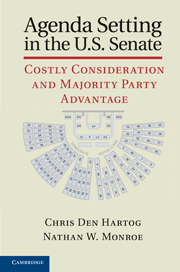Book contents
- Frontmatter
- Contents
- List of Tables and Figures
- Preface
- PART I COSTLY CONSIDERATION
- 1 Costly Consideration and the Majority's Advantage
- 2 The Textbook Senate and Partisan Policy Influence
- 3 The Costly-Consideration Agenda-Setting Theory
- PART II SENATE PROCEDURE AND CONSIDERATION COSTS
- PART III TESTING THE COSTLY-CONSIDERATION THEORY
- Appendix A Relaxing the Model's Assumptions
- Appendix B Last Actions and Coding Amendment Disposition
- Works Cited
- Index
3 - The Costly-Consideration Agenda-Setting Theory
from PART I - COSTLY CONSIDERATION
Published online by Cambridge University Press: 07 October 2011
- Frontmatter
- Contents
- List of Tables and Figures
- Preface
- PART I COSTLY CONSIDERATION
- 1 Costly Consideration and the Majority's Advantage
- 2 The Textbook Senate and Partisan Policy Influence
- 3 The Costly-Consideration Agenda-Setting Theory
- PART II SENATE PROCEDURE AND CONSIDERATION COSTS
- PART III TESTING THE COSTLY-CONSIDERATION THEORY
- Appendix A Relaxing the Model's Assumptions
- Appendix B Last Actions and Coding Amendment Disposition
- Works Cited
- Index
Summary
Congressional scholars widely believe that the majority party's influence over the agenda in the U.S. Senate is limited, due mainly to the chamber's supermajoritarian procedures and open amendment process. In this chapter, we present a spatial theory of agenda setting that incorporates these aspects of Senate procedure, yet leads to the conclusion that, although it is unable to dictate the agenda unilaterally, the majority party nonetheless influences the agenda to an extent largely unappreciated by prior scholarship.
One of the contributions of this model is to resolve the apparent contradiction in Senate scholarship discussed in the preceding chapter: recent studies conclude that the majority enjoys greater legislative success than the minority, but there is little understanding of how this could be the case. A strength of our model is that it incorporates conventional beliefs about Senate procedures and provides a clear analogy to Senate procedure.
The model's assumptions reflect the broad theoretical premises we discussed in the first chapter: first, agenda setting is costly; second, it is less costly for the majority party than for others; and, third, the majority party has a first-proposal advantage.
In a sense, our model is a one-dimensional spatial version of nonspatial bargaining models (Rubinstein 1982). One advantage of our model, however, is that it incorporates the effect of the status quo on bargaining outcomes (in bargaining models, the reversion in the absence of a deal is that each actor gets nothing, which is clearly not the case in the Senate).
- Type
- Chapter
- Information
- Agenda Setting in the U.S. SenateCostly Consideration and Majority Party Advantage, pp. 39 - 58Publisher: Cambridge University PressPrint publication year: 2011



